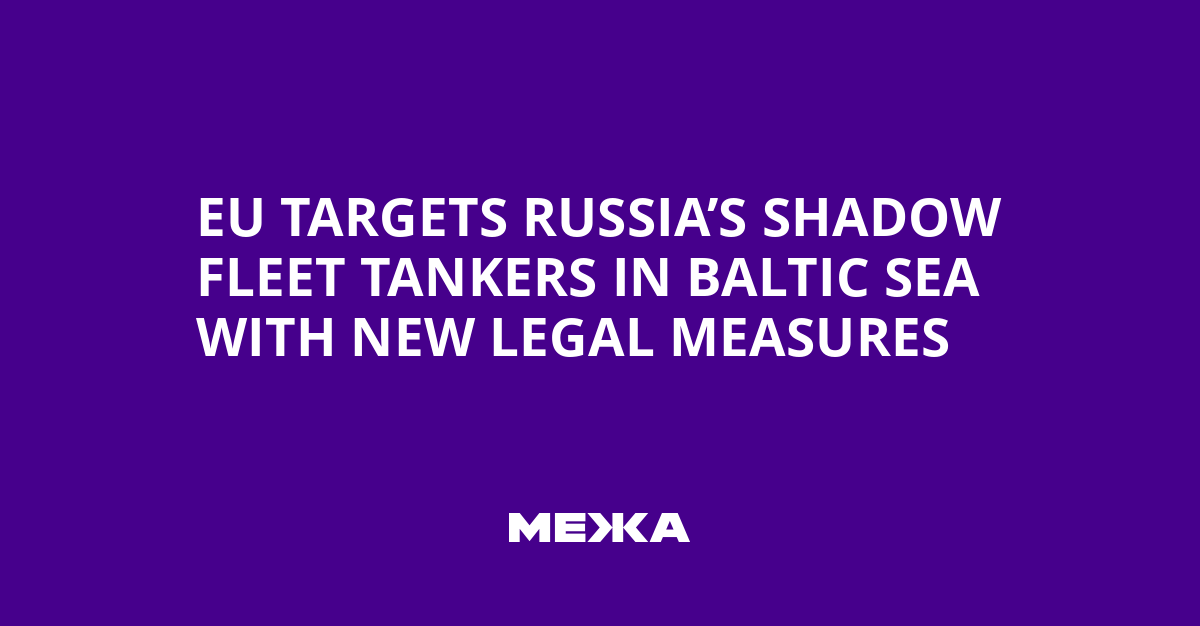The European Union is working on legal mechanisms to stop Russian tankers from the “shadow fleet” in the Baltic Sea. This concerns at least 16 flagless vessels that can be detained under Article 110 of the United Nations Convention on the Law of the Sea.
The information on this topic was provided by Andriy Yermak, the head of the Office of the President, who shared the details on Telegram.
“Our sanctions proposals from last year may translate into decisions. According to EUObserver, this concerns at least 16 flagless vessels that can be detained under Article 110 of the United Nations Convention on the Law of the Sea”
– Andriy Yermak
According to Yermak, in the 19th EU sanctions package, about 120 oil tankers from the Russian “shadow fleet” are planned to be added, increasing the total number of banned ships to 568.
Some of these ships no longer formally enter EU ports, but continue to use the Baltic Sea to transport oil.
“The use of the mechanism of international law and NATO countries’ willingness to enforce it – this is a key signal to the Kremlin: its attempts to circumvent sanctions are not working. We need to curb Russia’s capabilities faster. Moscow is already waging a hybrid war against Europe, and here speed matters significantly”
– Andriy Yermak
Russia’s Shadow Fleet and Sanctions
Russia has created a “shadow fleet” – a network of oil tankers used to circumvent international sanctions imposed due to its aggression against Ukraine. This fleet allows the Kremlin to continue exporting oil, notably to China and India, even after import restrictions on Russian oil into the EU were introduced.
According to the Main Directorate of Intelligence of the Ministry of Defence of Ukraine, the “shadow fleet” of the Russian Federation numbers over a thousand tankers, including 238 ships actively involved in circumventing sanctions. These tankers often change flags, disconnect tracking systems, and operate without proper insurance, making them harder to detect and identify.
The international community is actively responding to the problem. The EU has repeatedly expanded sanction lists, adding ships linked to the “shadow fleet”. Thus, in the 15th package, the EU added several dozen ships involved in illicit transport of Russian oil. Australia imposed sanctions against 60 ships, and Canada announced sanctions against more than 200 ships.
Despite these international efforts, Russia continues to use the “shadow fleet” to secure its economic interests and finance military actions.
The EU’s 19th sanctions package against Russia: status and discussions
On September 19, the European Commission presented the 19th EU sanctions package against Russia. It is currently under consideration by EU member states. The Commission proposed sanctions in the areas of energy, finance, and military technologies, including a full ban on transactions for Rosneft and Gazprom Neft, and the freezing of assets of other companies.
“They are blackmailing us about other things. And it was unclear which exactly – it referred, in particular, to energy, transport”
– a source from the information service
On September 26, Slovakia expressed objections to certain points in the 19th package of sanctions, particularly regarding energy and the automotive market. On October 3 at a meeting of EU ambassadors, they did not reach agreement on the 19th package against Russia, but they achieved significant progress in negotiations. Details of possible measures and restrictions have not yet been disclosed.
In sum, the EU continues to refine legal mechanisms and tighten control over the shadow fleet, aiming to reduce Russia’s financial flows and strengthen the effectiveness of sanctions in the Baltic region.
